Related Research Articles

Footsteps in the Dark is a 1941 American comedy mystery film directed by Lloyd Bacon and starring Errol Flynn, Brenda Marshall and Ralph Bellamy. It was produced and distributed by Warner Bros. Flynn plays a novelist and amateur detective investigating a murder. It takes its title from the 1935 play Footsteps in the Dark by Ladislas Fodor and also used material from the 1937 play Blondie White by Jeffrey Dell.
Road House is a 1934 British comedy crime film directed by Maurice Elvey and starring Violet Loraine, Gordon Harker and Aileen Marson.

The Black Abbot is a crime novel by the British writer Edgar Wallace which was first published in 1926 about the ghost of an abbot haunting the grounds of an old abbey and protecting a lost treasure.
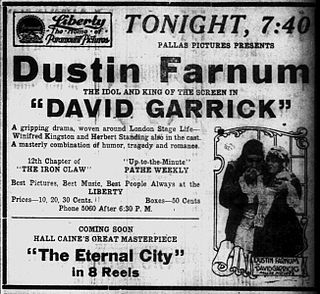
David Garrick is a 1916 American silent historical film directed by Frank Lloyd and starring Dustin Farnum, Winifred Kingston and Herbert Standing. The film was based on Thomas William Robertson's 1864 play of the same name, which portrayed the life of the eighteenth century British actor David Garrick. It was one of several film versions of the play made during the silent era.
The Idol of Paris is a 1914 British silent drama film directed by Maurice Elvey and starring Elisabeth Risdon, Fred Groves and A. V. Bramble. The film was based on a play of the same title by Charles Darrell.

The Uncle from America is a 1953 West German comedy film directed by Carl Boese and starring Hans Moser, Georg Thomalla and Joe Stöckel. It was based on a play by Ferdinand Altenkirch which had previously been made into the 1932 film No Money Needed. It was shot at the Spandau Studios in Berlin. The film's sets were designed by the art director Erich Grave and Walter Kutz.
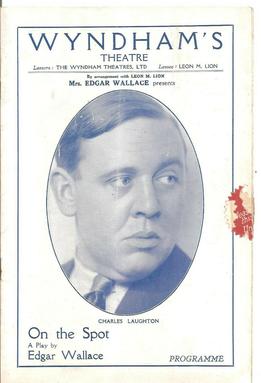
On the Spot is a 1930 Chicago-set play by the British writer Edgar Wallace. Wallace was inspired by a visit to the United States and, in particular, the Saint Valentine's Day Massacre. Known as a prolific author, he reportedly dictated the manuscript for the play in just four days. It was his greatest theatrical success.
The Old Man is a 1931 mystery play by the British writer Edgar Wallace. Its original production was staged at Wyndham's Theatre in London's West End for a ninety performance run. It is set entirely in the "Coat of Arms" tavern where a mysterious old man lurks in the background, reputedly an escapee from a lunatic asylum. The original cast included Alfred Drayton, Jack Melford, Harold Warrender and Finlay Currie.
The Terror is a 1927 mystery thriller play by the British writer Edgar Wallace. It is based on Wallace's 1926 novel The Black Abbot.

Benighted is a 1927 novel by the British writer J.B. Priestley. Priestley's second published novel, the story explores the post-First World War disillusionment that Britain felt during the time period. A number of travellers are forced to take shelter at an old Welsh country house during a storm. The book was released in the United States in 1928.
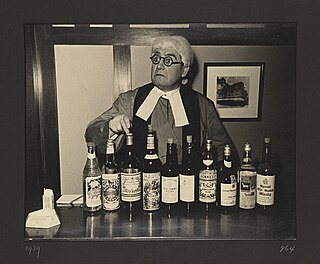
The Unguarded Hour is a 1935 play by Bernard Merivale, inspired by a Hungarian work by Ladislas Fodor.
Bernard Merivale (1882–1939) was a British playwright and screenwriter.

Blondie White is a 1937 mystery play by British writer Jeffrey Dell and Bernard Merivale. A murder mystery, it was inspired by an earlier play by Hungarian writer Ladislas Fodor. A famous crime novelist helps Scotland Yard to solve the murder of a nightclub performer, Blondie White.
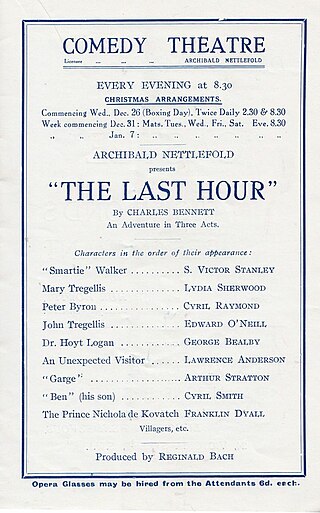
The Last Hour is a 1928 comedy thriller play by the British writer Charles Bennett. At an inn on the coast of Devon, a secret agent battles a foreign prince trying to smuggle a stolen death ray out of the country.

Blackmail is a 1928 thriller play by the British writer Charles Bennett. In Chelsea, an artist's model kills an artist when he attempts to assault her.
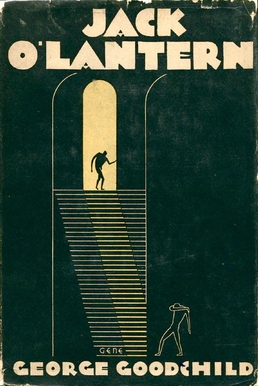
Jack O'Lantern is a 1929 mystery thriller novel by the British writer George Goodchild. Goodchild was a prolific writer of thrillers in the style of Edgar Wallace and Sydney Horler. It was published in the United States the following year by The Mystery League. Another of his novels The Monster of Grammont was published by them in 1931.
Père Goriot is a 1915 silent film based on the 1835 novel of the same name by French novelist and playwright Honoré de Balzac. Directed by Travers Vale, the film starred Edward Cecil in the title role. It was made by the Biograph Company, and consisted of three reels.

Ten Minute Alibi is a 1933 crime thriller play by the British author Anthony Armstrong. It premiered at the Embassy Theatre in Swiss Cottage before transferring to London's West End. It ran for 857 performances between 8 February 1933 and 26 January 1935, initially at the Haymarket Theatre before switching to the Phoenix Theatre. The London cast included Anthony Ireland, Robert Douglas, Bernard Lee, George Merritt, Charles Hickman, Celia Johnson, Jessica Tandy, Gillian Maude and Aileen Marson. It was directed by Sinclair Hill. A Broadway version at the Ethel Barrymore Theatre ran for 89 performances.

Murder Mistaken is a 1952 thriller play by the British author Janet Green. It first appeared at the Prince of Wales Theatre in Cardiff under the title Teddy Bare's Picnic. It then transferred to London's West End under its new title first at the Ambassadors Theatre and then at the Vaudeville Theatre. It's West End run lasted 156 performances between 4 November 1952 and 28 March 1953. The West End cast included Derek Farr, Anthony Marlowe, Phyllis Morris, Iris Hoey, Brenda de Banzie, Patricia Burke and Rosalie Crutchley. It appeared on Broadway under the alternative title Gently Does It, lasting for thirty seven performances at the Playhouse Theatre. Green wrote a novelisation in 1953 with Leonard Gribble.

The Bellamy Trial is a 1927 mystery crime novel by the American writher Frances Noyes Hart. It was inspired by the Hall–Mills murder case of 1922. In 1948 it was awarded the Grand Prix de Littérature Policière in France.